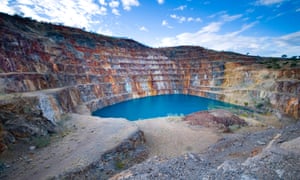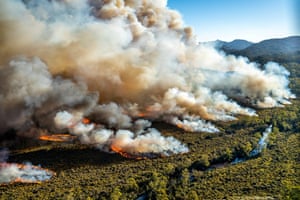Paris agreement target will not be met without changes to policy and threatened species at risk unless funding increased
Australia is not on track to meet its 2030 emissions targets under
the Paris agreement and needs to bring its environment policies into
line with the “scale of the challenge” the country is facing, one of the
world’s pre-eminent economic institutions says.
In a major report on Australia’s environmental performance, the Organisation for Economic Cooperation and Development also finds the status of Australia’s biodiversity is “poor and worsening” and the government’s national threatened species strategy will fail unless it is expanded and funding increased.
The report is the third OECD review of Australia’s track record of protecting its environmental assets, with previous reports published in 2007 and 1998.
In a statement on Wednesday, the institution said “the country will fall short of its 2030 emissions target without a major effort to move to a low-carbon model”.
“Australia is home to a 10th of global species and is seen by many as synonymous with pristine coastal areas and an outback brimming with nature. However the country is increasingly exposed to rising sea levels, floods, heat waves, bushfires and drought,” said the OECD’s deputy environment director Anthony Cox.
“This makes it all the more important that Australia take a more
proactive role in fighting climate change and addressing biodiversity
loss.”In a major report on Australia’s environmental performance, the Organisation for Economic Cooperation and Development also finds the status of Australia’s biodiversity is “poor and worsening” and the government’s national threatened species strategy will fail unless it is expanded and funding increased.
The report is the third OECD review of Australia’s track record of protecting its environmental assets, with previous reports published in 2007 and 1998.
In a statement on Wednesday, the institution said “the country will fall short of its 2030 emissions target without a major effort to move to a low-carbon model”.
“Australia is home to a 10th of global species and is seen by many as synonymous with pristine coastal areas and an outback brimming with nature. However the country is increasingly exposed to rising sea levels, floods, heat waves, bushfires and drought,” said the OECD’s deputy environment director Anthony Cox.
The latest review highlights numerous environmental challenges, including the emissions intensity of Australia’s economy, but singles out economic opportunities including “untapped renewable energy potential” and the ability for the country’s “rich biodiversity” to support the economy.
Among its findings, the OECD warns:
• Australia is one of the most carbon-intensive economies in the OECD, has no national long-term strategy for lowering emissions, and despite targets in place under the Paris agreement “emissions are projected to increase by 2030”.
• Australia’s energy taxes do not reflect the climate cost associated with fuel use. “Taxes on transport fuels are low by international comparison; tax refunds mean fuels are largely untaxed outside of transport, and coal is fully untaxed.”
• Australia’s wildlife is in a poor state and its condition is worsening, with “81 ecosystems, 511 terrestrial and aquatic animal species and 1,355 plant species” listed as threatened at the national level.
• Only one of the 10 targets of the National Biodiversity Conservation Strategy 2010-2030 has been met and the first draft of Australia’s Strategy for Nature 2018-2030 “appeared unlikely to catalyse progress”. The OECD calls for more Commonwealth leadership to guide biodiversity policy.
• The government’s threatened species strategy will only improve the status of the country’s wildlife if it is expanded and there is a substantial increase in the amount of resources directed to it.
• About 50,000 mines around the country need rehabilitation and not all states and territories have comprehensive registers of contaminated sites or remediation standards.

• “Economic interests still tend to dominate decision making” with regard to the environment, and public participation in environmental decision making, particularly for Indigenous communities, should be increased.
• With the exception of the Reef 2050 plan, funding for conservation and research is falling.
• Public spending on biodiversity has remained between $400m and $500m since 2010 compared with an average of $13bn for road transport and infrastructure.
• In the past 10 years, more than three-quarters of transport investment has been directed to road construction and Australian cities have less travel by public transport than similar cities elsewhere.
The OECD said Australia needed to strengthen its climate change and biodiversity policies if it wanted to make progress towards sustainable development and better coordinate work between state and federal governments.
The report highlights the work being done by state governments to reach net zero emissions in the absence of federal policy.
“Australia has strong potential to green its economy but the low-carbon transition will require stronger price signals,” it says.
The environment minister Melissa Price said on Wednesday the OECD report was wide-ranging and “includes recognition of the excellent work Australia is doing in protecting and conserving our unique environment, as well as recommendations for improvement”.
“The report praises Australia’s outstanding achievements in protecting both land and sea through reserves. It notes that our National Reserve System covers about 20% of Australia’s land, which is above the OECD average of 15%,” she said.
Desalination, dams and the big dry: the challenges of managing Australia's water supply – video
The Australian Conservation Foundation said the report highlighted the benefits for Australia of transitioning to a more sustainable economy, cutting pollution and restoring nature.
The ACF’s chief executive Kelly O’Shanassy said the OECD had singled out a “litany of failures” over the past decade that were “the result of a persistent attitude among some irresponsible politicians and businesses that the environment had to suffer to turn a profit”.
“In this election year our major political parties have an opportunity to detail to the community how they would embrace a cleaner and greener plan for our country and our economy,” she said.
“The OECD is clear. Australia is failing to protect the environment and we are doing damage at record speed.”

No comments:
Post a Comment